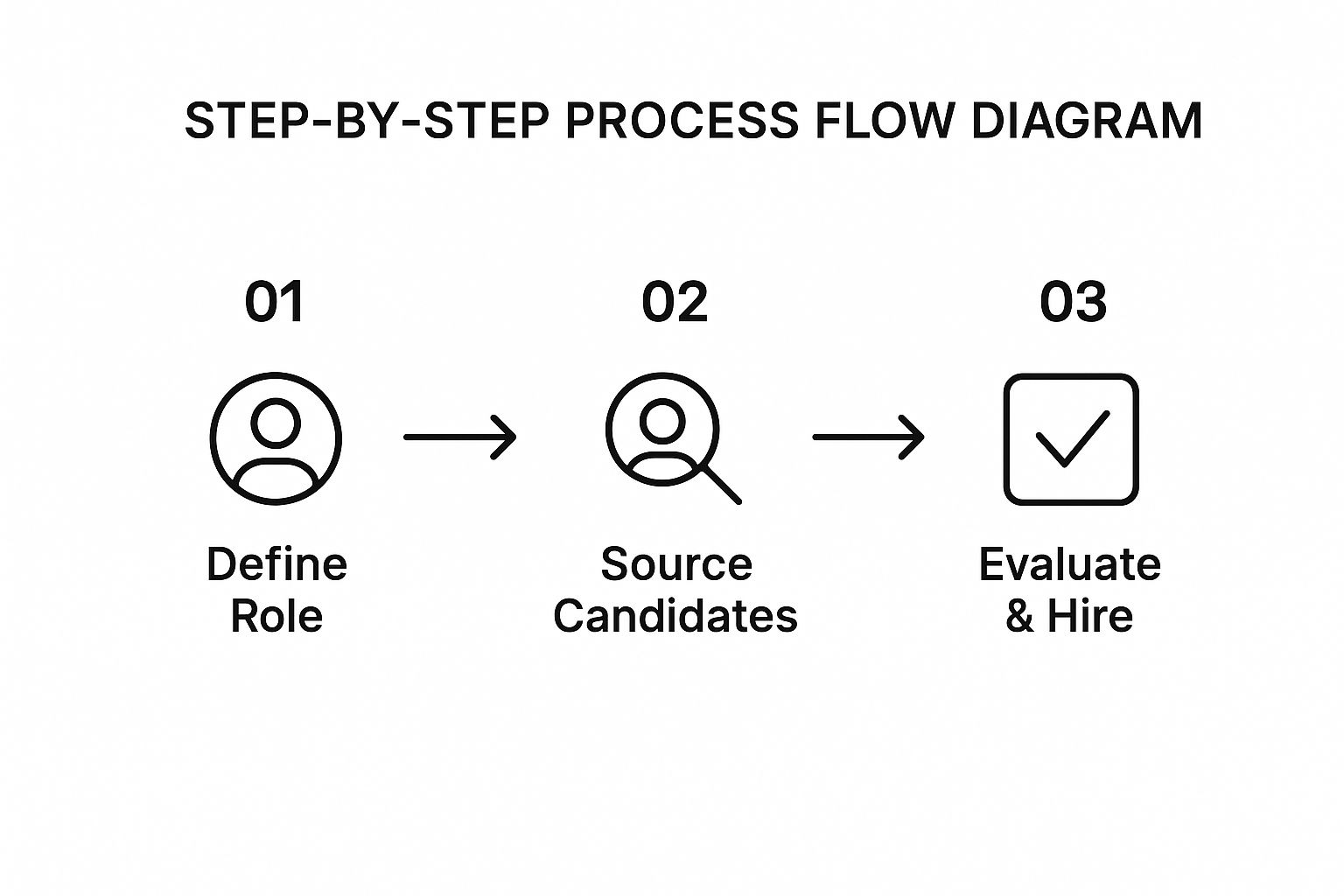Human Resource Executive Search Done Right
- Talent People

- Sep 17, 2025
- 13 min read
When you need to hire a senior HR leader, like a Chief Human Resources Officer (CHRO), you’re not just filling another vacancy. You’re finding a strategic partner who will shape your company's culture and steer its growth. This is where human resource executive search comes in.
It’s a highly specialised recruitment service designed to identify, attract, and hire the absolute best HR talent. Think of it as a discreet, research-heavy mission to find leaders who aren't even looking for a new role.
The Architect Analogy for Executive Search

Imagine you’re about to build your company’s flagship headquarters. Would you just post an ad for an architect and hope the right person applies? Of course not. You’d seek out a world-class professional known for designing visionary and enduring buildings.
That’s the perfect way to think about human resource executive search.
Hiring a top-tier HR executive—whether it's a CHRO, a VP of Talent, or a Head of People—is just as foundational as that building project. These leaders are the architects of your culture, your growth, and your company's future. They aren't just administrators; they are visionaries.
Beyond Standard Recruitment Methods
This is why the process is so different from standard recruitment. Executive search operates on a 'retained search' model, which is a world away from the typical contingency approach where a recruiter only gets paid if they fill the role.
A retained human resource executive search firm works as your dedicated consultant. They dive deep into the market, mapping out the talent landscape and confidentially finding the perfect leader for your unique needs. The focus is always on long-term success, not a quick hire.
This exclusive partnership is crucial because the most effective HR leaders are rarely scrolling through job boards. They’re already excelling in their current roles. A search firm has the expertise to identify these individuals, approach them discreetly, and assess them with a rigour that goes far beyond a simple CV review.
To make this difference clearer, let's compare the two models side-by-side.
Retained Search vs Contingency Recruitment at a Glance
Feature | Human Resource Executive Search (Retained) | Standard Recruitment (Contingency) |
|---|---|---|
Relationship | Exclusive, consultative partnership with one firm. | Non-exclusive, often competing with other agencies. |
Payment Model | Fee paid in instalments throughout the search process. | Fee paid only upon successful placement. |
Candidate Pool | Taps into the entire market, including passive candidates. | Primarily focuses on active job seekers. |
Process | Deep research, market mapping, and rigorous vetting. | CV screening and matching to job descriptions. |
Focus | Long-term strategic fit and cultural alignment. | Speed and filling the vacancy quickly. |
Commitment | Guaranteed commitment to fill the role. | No guaranteed outcome; agencies may drop the search. |
As the table shows, the retained model is a far more strategic and invested process, which is exactly what’s needed for roles of this importance.
A Market Built on Trust and Expertise
The continued growth of this specialised field speaks volumes. In fact, the UK executive search industry's revenue recently hit around £1.8 billion, a testament to its consistent performance. You can dig into more executive search market trends on IBISWorld. This figure shows just how much trust companies place in expert search partners to secure their most critical leaders.
Ultimately, you’re not just filling a role; you’re making a strategic investment. You’re connecting with an executive who will become a true partner to the CEO, someone capable of:
Driving real organisational change.
Building a high-performing and resilient culture.
Tying talent strategy directly to business goals.
Preparing the workforce for whatever comes next.
When you engage a human resource executive search firm, you’re not just hiring an employee. You’re securing the architect of your company’s future.
Why Specialist Search Is Crucial for Success
The world of human resources has completely changed. Gone are the days when HR was just an administrative department. Today, HR leaders are strategic partners at the executive table, shaping business outcomes directly. This shift means the stakes for hiring a new HR executive are incredibly high. The right person can steer the company to success, while the wrong one can cause real, lasting damage.
This is exactly why a generic recruitment approach just doesn't cut it anymore. Finding a visionary Chief Human Resources Officer (CHRO) isn't about posting a job ad and hoping for the best. It demands a focused, specialist strategy. A dedicated human resource executive search is so vital because it gives you three key advantages you simply won’t get anywhere else.

Unlocking the Hidden Talent Market
Let’s be honest: the best HR executives are rarely looking for a job. They’re usually busy excelling in their current roles, delivering fantastic results and making a real impact. A specialist search firm has the credibility and the network to tap into this passive talent pool discreetly.
Imagine a fast-growing tech firm that needs an HR leader to navigate a massive digital transformation. The perfect candidate probably isn't scrolling through job boards. They’re more likely leading a similar project somewhere else. A true search partner can:
Pinpoint these high-flyers through meticulous market research.
Start confidential conversations to see if they might be open to a move.
Frame your opportunity in a way that resonates with their long-term career goals.
Market Intelligence That Shapes Strategy
Hiring an executive without solid market data is like trying to navigate a new city without a map. A specialist firm brings invaluable intelligence to the table—insights on compensation trends, what competitors are doing, and the specific skills that define a top-tier HR leader right now.
This insight is gold. Knowing what truly motivates a top CHRO—whether it’s a significant equity stake or the promise of a unique company culture—is the key to building an offer that not only attracts the best but actually gets them to sign.
This data-driven guidance ensures your offer is both competitive and compelling. It helps you avoid the disappointment of a failed negotiation or, worse, losing your number one candidate to a rival.
Protecting Confidentiality and Brand Integrity
Many senior-level searches need to be kept under wraps. Perhaps a long-serving executive is about to retire, or the company is planning a strategic shift that can’t go public yet. A public job posting would signal your moves to competitors and could easily stir up unease internally.
An human resource executive search partner acts as your confidential intermediary, protecting your plans. They can explore the market and vet potential leaders without ever revealing your company’s name until the time is right. This approach safeguards your strategy, maintains stability within your team, and keeps you in complete control of the story surrounding this crucial leadership change.
The Executive Search Process Unpacked
Finding the right HR executive isn’t a simple transaction; it’s a detailed, strategic journey built on a true partnership. Think of it less like filling a vacancy and more like a carefully managed campaign. It's not some mysterious "black box" process. Instead, it’s a logical, step-by-step collaboration designed to land the perfect leader for your business.
The entire thing starts not with looking at CVs, but with getting under the skin of your organisation. This first step is the bedrock for everything that comes next.
Stage 1: The Deep Dive Briefing
Before a single candidate's name is even whispered, a good search firm will spend a lot of time getting to know you. This is much more than just a quick read of the job description. The real goal is to understand your company's DNA – its culture, its big-picture goals, where it sits in the market, and the specific hurdles the new HR leader will need to clear.
This briefing stage involves frank, in-depth conversations with the key people who have a stake in the hire, from the CEO right through to board members. It’s all about getting everyone on the same page and defining what success in this role actually looks like.
A detailed brief is the search's North Star. It guides every decision, from which industries to target to which leadership competencies are non-negotiable, preventing costly missteps later on.
Stage 2: Market Mapping and Candidate Engagement
Once that brief is crystal clear, the real research kicks off. The consultants will map the market, identifying the companies and individuals who fit the bill. This isn't just about tapping into a database; it’s a proactive intelligence-gathering mission to find leaders who aren’t just qualified, but who are making a real impact where they are right now.
Then comes the delicate art of the approach. Top-tier executives are almost never actively looking for a new job, so you can't just send them a message on LinkedIn. The consultants act as ambassadors for your brand, reaching out discreetly and professionally to present the opportunity in a way that genuinely sparks the interest of these high-performing, passive candidates.
The flow below gives you a sense of this journey.

This image neatly lays out the core stages, showing how defining the role and sourcing candidates are the foundational steps that eventually lead to the final hire.
Stage 3: Rigorous Assessment and Shortlist Presentation
When promising candidates show interest, the vetting process begins, and it’s intense. We're talking about a lot more than just double-checking a CV. A proper assessment includes:
Competency-Based Interviews: These aren't your typical interviews. They are structured conversations designed to dig for real, concrete evidence of past performance and leadership skills.
Psychometric and Leadership Assessments: These tools offer objective, data-driven insights into a candidate's working style, cognitive abilities, and potential as a leader.
Informal Referencing: This involves discreetly checking in with trusted contacts in their network to get an honest take on a candidate's reputation and achievements.
Only the very best, most suitable individuals will make it onto the final shortlist. You'll be presented with a small, curated group of elite candidates, each one fully vetted and genuinely keen on the role. This saves your leadership team a huge amount of time and effort. If you want to dive deeper into how this all works, you can master the executive recruitment process with our detailed guide.
The search firm doesn’t just hand over the list and walk away. They’ll help schedule the interviews, manage all the feedback, and guide both you and your chosen candidate through the often tricky offer negotiations. Their job isn’t done until your new leader is successfully onboarded, ready to make an impact from day one.
While every search is unique, the timeline generally follows a predictable pattern. Here’s a rough guide to how long each phase typically takes.
Typical Timeline for an HR Executive Search
Phase | Typical Duration |
|---|---|
Briefing & Role Definition | 1-2 weeks |
Market Mapping & Candidate ID | 2-3 weeks |
Candidate Engagement & Initial Vetting | 2-4 weeks |
Shortlist Presentation & Client Interviews | 2-3 weeks |
Final Interviews & Referencing | 1-2 weeks |
Offer Negotiation & Acceptance | 1-2 weeks |
This shows that a thorough search, from the initial brief to the final offer, often takes around 3 to 4 months. Rushing any of these steps can compromise the quality of the final hire.
Skills That Define Modern HR Leaders
The image of a top-tier HR executive has completely transformed. What was once an administrative expert is now a strategic driver of the business, and the skills needed to succeed have changed right along with it. A modern human resource executive search isn't about finding someone to manage policies; it's a mission to find a leader who can directly impact the company's bottom line.
The most in-demand HR leaders today are those who can marry sharp commercial instincts with a deep understanding of people. They need to think like a CFO about the return on talent investments, while also acting as the company's cultural compass. This dual focus isn't just a nice-to-have anymore—it's the new benchmark for executive talent.

From Administrator to Strategic Architect
The biggest evolution has been the shift from reactive management to proactive strategy. Today's HR executives are expected to be fluent in data analytics, using people-centric metrics to shape major business decisions. They don’t just report on staff turnover; they build predictive models to spot flight risks and develop plans to keep their best people before it’s too late.
This strategic mindset is also crucial for organisational design and managing change. Whether a company is navigating a merger, a digital overhaul, or rapid growth, the HR leader is the one designing a workforce that can adapt and flourish. For aspiring leaders, getting a grip on these principles is essential, which is why mastering leadership development coaching has become such a vital career move.
Digital Fluency and AI Savviness
You simply cannot lead in HR today without a solid grasp of technology's impact on work. HR leaders must champion the digital tools that make employees' lives better and the business more efficient, all while preparing the organisation for the growing influence of Artificial Intelligence.
This trend is reshaping what executive talent even means. In fact, over 60% of board-level executive search briefs now list AI or data transformation experience as a key requirement. With 72% of organisations also open to hiring executives remotely, the focus has swung firmly from where you are to what you can do.
Today’s most impactful HR executives are champions of change, masters of data, and builders of inclusive cultures. They connect talent strategy directly to the bottom line, proving that a company's greatest asset is its people.
When it comes down to it, search firms are looking for candidates who can clearly demonstrate how they drive business growth through people. These leaders have a rare mix of skills:
Commercial Acumen: They can read a financial statement and clearly explain how HR initiatives deliver real business value.
Data Literacy: They use analytics to tell powerful stories that guide strategic workforce planning.
Cultural Leadership: They are hands-on in building and nurturing an inclusive, high-performance culture where people feel they can thrive.
How to Choose the Right Search Partner
Picking a firm for a human resource executive search is a decision just as critical as the hire itself. This isn't about finding a supplier; it's about forming a genuine partnership that will help shape the future of your leadership team. The right firm will feel like an extension of your own company, getting to grips with your culture and strategic goals on a deep level.
The best way to start is by looking past the glossy brochures and focusing on real, tangible proof of their expertise. A firm’s specialisation is a massive clue. Do they live and breathe your industry, or are they generalists trying to be all things to all people? A specialist partner brings market intelligence and a network that a generalist simply can’t compete with.
Evaluating Potential Partners
As you start talking to potential firms, you need to zero in on three things: their track record, their process, and their people. A top-tier firm will be an open book in all three areas, providing clear evidence of what they can do and how they do it. Don't be shy—ask the tough questions to make sure they’re the right fit for your organisation.
Here’s what you should be looking for:
Proven Industry Specialisation: Ask for specific examples of HR executive roles they’ve recently filled in your sector. This shows they have real-world experience, not just a few keywords on their website.
A Strong and Verifiable Track Record: Request case studies or anonymised stories of their successful placements. Listen closely to how they describe the challenges they faced and the clever solutions they came up with.
Transparent Communication: A great partner keeps you in the loop without you having to chase them. Ask how they plan to keep you updated, how often you’ll hear from them, and who your main point of contact will be.
Key Questions for Your Shortlist
Once you’ve narrowed it down to a few potential firms, it’s time to get into the detail. The questions you ask now will reveal the true nature of the partnership you’re signing up for. This is where you can separate the genuine strategic consultants from the more transactional recruiters.
A partnership with an executive search firm is built on trust and cultural alignment. They will be representing your brand in the market, so you must be confident they share your values and can articulate your vision with authenticity.
To get that confidence, ask them directly:
What are your research methods? How do you find and connect with high-calibre leaders who aren’t even looking for a new job?
How do you approach diversity and inclusion? Ask for concrete examples of how they ensure a fair process and build a diverse shortlist of candidates.
How do you define a successful placement? Their answer should be about more than just filling the seat. Look for a focus on long-term impact, retention, and how the leader thrives within your organisation.
Making a careful choice is more critical than ever. In a tight market where hiring has slowed, recruiters need to be incredibly resilient and adaptable to stay afloat. For more on this, you can explore the challenges shaping the UK recruitment sector on Ryecroftglenton.com.
Choosing the right partner means you don’t just get a list of candidates; you get a lasting leadership solution. For more guidance, check out our guide on hiring a modern executive search consultant.
Your Top Questions About Executive Search Answered
Deciding to bring in an executive search firm for a key HR role is a big step, and it's completely normal to have a lot of questions. Getting your head around the practicalities – from what it costs to how long it takes and what happens if things don't work out – is essential for feeling confident about the partnership.
Let's cut through the jargon and give you some straight answers to the questions we hear most often.
How Much Does An Executive Search Cost?
This is usually the first thing on a leader's mind. The cost is directly tied to the partnership model of the search. The industry standard is a professional fee that's a percentage of the successful candidate's guaranteed first-year cash compensation.
Typically, this fee lands somewhere between 30% and 33%. It's important to understand this isn't a simple 'finder's fee' paid right at the end. Instead, it’s usually paid in three stages:
Getting Started: The first payment is an initial retainer. This officially kicks off the search and commits the firm’s dedicated resources to your project.
Presenting Candidates: The second instalment is usually due when the firm presents you with a fully vetted and qualified shortlist of candidates.
The Final Hire: The last payment is made once your chosen candidate accepts the offer and the role is filled.
This retained approach ensures the search firm is fully committed, dedicating its senior consultants and research team to your search from day one.
How Long Does The Process Take?
Every search has its own unique rhythm, but you can generally expect a well-run HR executive search to take between 12 to 16 weeks. This covers everything from the initial deep-dive briefing right through to the candidate signing on the dotted line. A good firm will always lay out a detailed project plan with clear milestones right from the start.
Just think about it – the initial market mapping and confidential outreach to potential candidates can take four to six weeks on its own. After that, you have several more weeks of in-depth interviews, assessments, and thorough reference checks. While you can sometimes move faster, rushing often means you risk compromising on the quality and long-term success of the hire.
Why Can't We Just Use LinkedIn?
Look, LinkedIn is a fantastic tool. But for a senior HR leadership role, relying on it alone is like trying to catch a specific, rare fish with a single, small net. You’ll miss the vast majority of the talent pool – specifically, the passive candidates.
The very best executives are rarely scrolling through job boards. A search firm has the credibility and skill to approach these leaders discreetly, framing your opportunity in a way that sparks their interest, even when they weren't planning on moving.
Beyond that, a true search partner does so much more than just find names. They give you invaluable market intelligence, handle tricky negotiations, and conduct a level of vetting that a public profile could never hope to reveal.
What Happens If The New Hire Doesn't Work Out?
This is a perfectly valid and important question. It gets to the heart of what a real search partnership is all about. Reputable firms stand by their work. Most retained search agreements include a guarantee, which typically lasts for 12 months.
If the executive you hire leaves or is let go for performance reasons within that guarantee period, the firm will conduct a new search to replace them. This is usually done for no additional professional fee, though you might need to cover any new administrative or travel costs. It’s a powerful safety net for your investment and gives you real peace of mind.
At Talent People, we specialise in connecting high-growth organisations with the strategic HR leaders who drive success. Our project-based, embedded approach ensures every hire aligns with your vision. Discover how we can help you build your high-performing team.

Comments